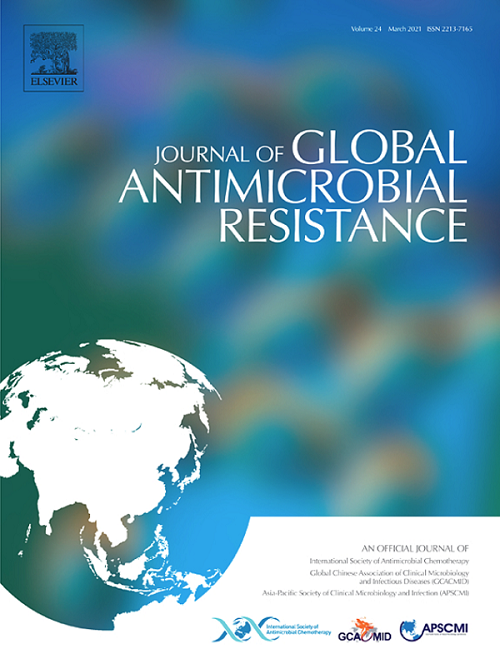Genomic characterization of carbapenem-resistant Pseudomonas aeruginosa from ICU admission screening in Hanoi, Vietnam, 2023
IF 3.2
3区 医学
Q2 INFECTIOUS DISEASES
引用次数: 0
Abstract
Objective
Vietnam is among the countries most affected by antimicrobial resistance in the Asia-Pacific. While multidrug-resistant Enterobacterales have been extensively studied, genomic data on multidrug-resistant Pseudomonas aeruginosa in Vietnam remains scarce. To address this, we characterized 20 carbapenem-resistant P. aeruginosa (CRPA) isolates from rectal colonization of ICU patients.
Methods
Screening for CRPA was conducted using a selective chromogenic medium (mSuperCARBA). Species identification was achieved through MALDI-TOF mass spectrometry, while antimicrobial susceptibility testing was performed using the Vitek®2 system and broth microdilution. Whole-genome sequencing was performed using the Illumina NextSeq platform.
Results
Twenty CRPA isolates were collected from rectal swabs of 691 patients admitted to the ICUs of the 108 Military Central Hospital in Hanoi, Vietnam, between 1 July 2023 and 31 October 2023. The predominant multilocus sequence type was ST308, accounting for 50% (10/20) of the isolates. Notably, 70% (14/20) of the CRPA isolates harboured genes encoding metallo-β-lactamases (MBL), with blaNDM-1 being the most prevalent (86%, 12/14), followed by blaIMP-26 (14%, 2/14). Low susceptibility was observed for ceftazidime-avibactam (15%, 3/20) and ceftolozane-tazobactam (10%, 2/20), while cefiderocol resistance was observed in 50% (10/20) of isolates. Colistin demonstrated the most favourable susceptibility profile, with 90% (18/20) of isolates remaining susceptible.
Conclusions
A significant proportion of CRPA isolates in our study were MBL producers, with high levels of resistance to novel β-lactams and β-lactam/β-lactamase inhibitor combinations. These findings underscore the urgent need for effective infection prevention and control strategies to mitigate the further spread of MBL-producing CRPA.
2023年越南河内ICU入院筛查中碳青霉烯耐药铜绿假单胞菌的基因组特征
目标:越南是亚太地区受抗菌素耐药性(AMR)影响最严重的国家之一。虽然对耐多药肠杆菌进行了广泛的研究,但越南耐多药铜绿假单胞菌的基因组数据仍然很少。为了解决这个问题,我们从ICU患者的直肠定植中分离了20株耐碳青霉烯类铜绿假单胞菌(CRPA)。方法:采用选择性显色培养基(mSuperCARBA)筛选CRPA。通过MALDI-TOF质谱法进行物种鉴定,使用Vitek®2系统和肉汤微量稀释进行抗菌药敏试验(AST)。使用Illumina NextSeq平台进行全基因组测序(WGS)。结果:2023年7月1日至2023年10月31日期间,从越南河内108军事中心医院重症监护室收治的691例患者的直肠拭子中收集到20株CRPA分离株。主要的多位点序列型(MLST)为ST308型,占50%(10/20)。值得注意的是,70%(14/20)的CRPA分离株含有编码金属β-内酰胺酶(MBL)的基因,其中blaNDM-1最为普遍(86%,12/14),其次是blaIMP-26(14%, 2/14)。对头孢他啶-阿维巴坦(15%,3/20)和头孢洛赞-他唑巴坦(10%,2/20)的敏感性较低,对头孢地罗col的耐药率为50%(10/20)。粘菌素表现出最有利的敏感性,90%(18/20)的分离株仍然敏感。结论:本研究中有相当比例的CRPA分离株是MBL产生菌,对新型β-内酰胺和β-内酰胺/β-内酰胺酶抑制剂组合具有高水平的耐药性。这些发现强调了迫切需要有效的感染预防和控制策略,以减轻产生mbl的CRPA的进一步传播。
本文章由计算机程序翻译,如有差异,请以英文原文为准。
求助全文
约1分钟内获得全文
求助全文
来源期刊

Journal of global antimicrobial resistance
INFECTIOUS DISEASES-PHARMACOLOGY & PHARMACY
CiteScore
8.70
自引率
2.20%
发文量
285
审稿时长
34 weeks
期刊介绍:
The Journal of Global Antimicrobial Resistance (JGAR) is a quarterly online journal run by an international Editorial Board that focuses on the global spread of antibiotic-resistant microbes.
JGAR is a dedicated journal for all professionals working in research, health care, the environment and animal infection control, aiming to track the resistance threat worldwide and provides a single voice devoted to antimicrobial resistance (AMR).
Featuring peer-reviewed and up to date research articles, reviews, short notes and hot topics JGAR covers the key topics related to antibacterial, antiviral, antifungal and antiparasitic resistance.
 求助内容:
求助内容: 应助结果提醒方式:
应助结果提醒方式:


